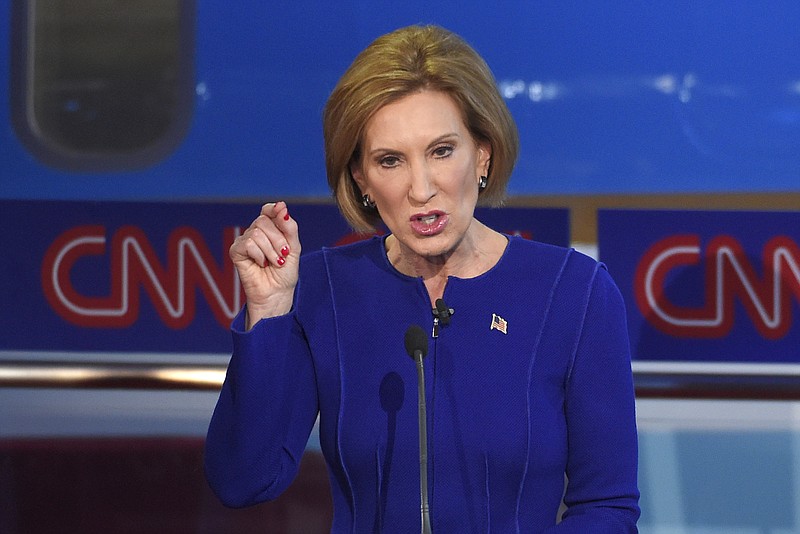Read more
GOP candidates debate Russia, immigration and TrumpFACT CHECK: Who's right: Trump or other GOP candidates?
Though the first presidential primary is more than five and a half months away, Wednesday night's Republican debate seemed to narrow the field that began with 17 candidates earlier in the summer.
Here's one observation of how the CNN debate with the 11 leading candidates at the Ronald Reagan Presidential Library in Simi Valley, Calif., left the field:
MOVING FORWARD
' Chris Christie - Almost invisible in the first debate, the New Jersey governor made strides with answers that seemed more from a conservative than the moderate he often is painted. He spoke to the importance of the electorate at least twice, asking the camera to focus on the audience with his opening statement (i.e., the audience being more important than the candidates) and taking business executives Donald Trump and Carly Fiorina to task when their exchange seemed to focus on their resumes and not on the American middle class.
' Carly Fiorina - The former Hewlett-Packard CEO probably turned more heads than any other candidate, particularly with her response to Trump for his previous criticism of her looks, her impassioned plea about the scourge of drugs and her withering riposte on Planned Parenthood. Having moved up from the second tier of candidates in the first debate, she appeared to belong.
' Marco Rubio - Sharp on the issues as he was in a recent appearance in Chattanooga, especially on Iran, Russia and other defense issues, the Florida senator received less exposure than many of the candidates but appeared ready for his moment with each answer. Younger than President Barack Obama when Obama was first elected, his grasp of issues and reality is much more impressive than the hope and change platitudes issued by the now-U.S. leader in 2008.
STAYING IN PLACE
' Jeb Bush - The former Florida governor spoke with more energy than in the first debate - as Trump derisively pointed out - in an effort to regain momentum. He was forceful but controlled in disputes with Trump and Texas Sen. Ted Cruz. And although he had no breakout moments, he did offer tough talk on Iran, China and economic growth. He also scored with a line about his brother, former President George W. Bush, keeping the country safe.
' Ben Carson - The soft-spoken former pediatric neurosurgeon was not as glib as he was in the first debate and showed naivety in suggesting former President Bush needed only be "Kennedy-esque" in dealing with Iraq and Afghanistan and asking that if anybody knew how to deal with illegal immigration, he was "willing to listen."
' Ted Cruz - The Texas senator played well to his base and seemed poised to receive some Trump supporters should the businessman's bubble burst, but his humorless, strident demeanor on issues such as the Iran nuclear agreement and Planned Parenthood sounded, even if he is on sound moral ground, in the words of one pundit, like a Baptist preacher who hadn't been to seminary.
' John Kasich - The Ohio governor seemed willing to play the role of the lone moderate Republican, suggesting the Iran nuclear agreement perhaps needed some time to determine if was a good deal, that current attempts to defund Planned Parenthood wouldn't go anywhere and how the country needed to "figure out how to come together" and deal with fiscal problems. But he also managed to get in several points about how he turned around his state's economy.
' Scott Walker - The Wisconsin governor is no less a worthy candidate than he was months ago when he vaulted to the top of several polls, but he seems diminished on the stage with several more polished and even physically larger candidates. On various issues, he gave sound conservative answers, but his ideas for replacing Obamacare were never more than a mention. If he is to remain viable, he will need to find a breakout issue.
MOVING BACKWARD
' Mike Huckabee - Probably hurt in the eyes of one portion of the electorate over his dogged defense of Kentucky clerk Kim Davis over the last several weeks, he didn't make much headway. He did offer traces of his trademark humor. On the Iran nuclear agreement, for instance, he said the president treats it like the Magna Carta, but the Iranians treat it like toilet paper.
' Rand Paul - Though unfairly attacked right out of the box by Trump, he nevertheless looked out of place with isolationist answers on foreign policy questions in a dangerous time in the world and in offering a laissez faire attitude about marijuana use. His smarmy stage presence also seems to color and cause his answers on important policy issues to appear less serious.
' Donald Trump - The billionaire blowhard again had few answers that delved below the surface. He appeared defensive in answering opponents' thrusts and had to weather several awkward moments of his own making after attacking Paul, making his comment about Fiorina and accusing Bush of favoring Hispanic-centric policies because of his Mexican wife.
